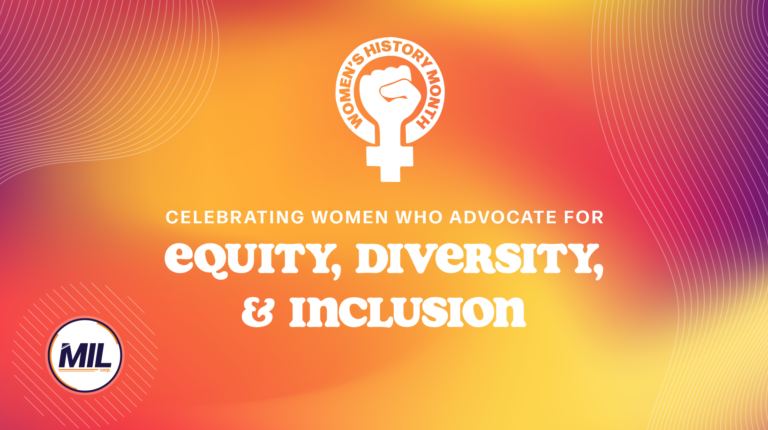March is Women’s History Month—a time to celebrate the contributions women have made to history, culture, and society. To observe Women’s History Month this year, we are stopping to reflect on the many challenges working women, past and present, face every day to gain acceptance and equal treatment in the workplace. To ensure that today’s women can enjoy the same status, standing, and success as men, women of past generations encountered and overcame untold barriers. For that, we salute them and honor their sacrifices and persistence, and work to carry on their noble pursuit of parity for all.
At MIL, our goal is to ensure that the career paths for all employees are free of barriers to success irrespective of gender identity. We nonetheless acknowledge that women may still encounter various obstacles in their professional lives. MIL supports women and fosters a fair and equitable workplace. Examples include allowing flexible work options, facilitating mentorships for junior staff, and encouraging work-life balance to help women, particularly working moms, advance in their careers.
One way we ensure this goal is achievable, especially for our youngest female employees, is by learning from the high-achieving women in our own workforce—women who have already broken through barriers and overcome the obstacles that stood in their way. Join us this month as we embrace this year’s theme of “Women Who Advocate for Equity, Diversity and Inclusion,” and get to know a few of the dynamic women of MIL as we lean into the wisdom and life experiences of four of our outstanding female leaders from the fields of engineering, communications, finance, and executive management.
___________________________
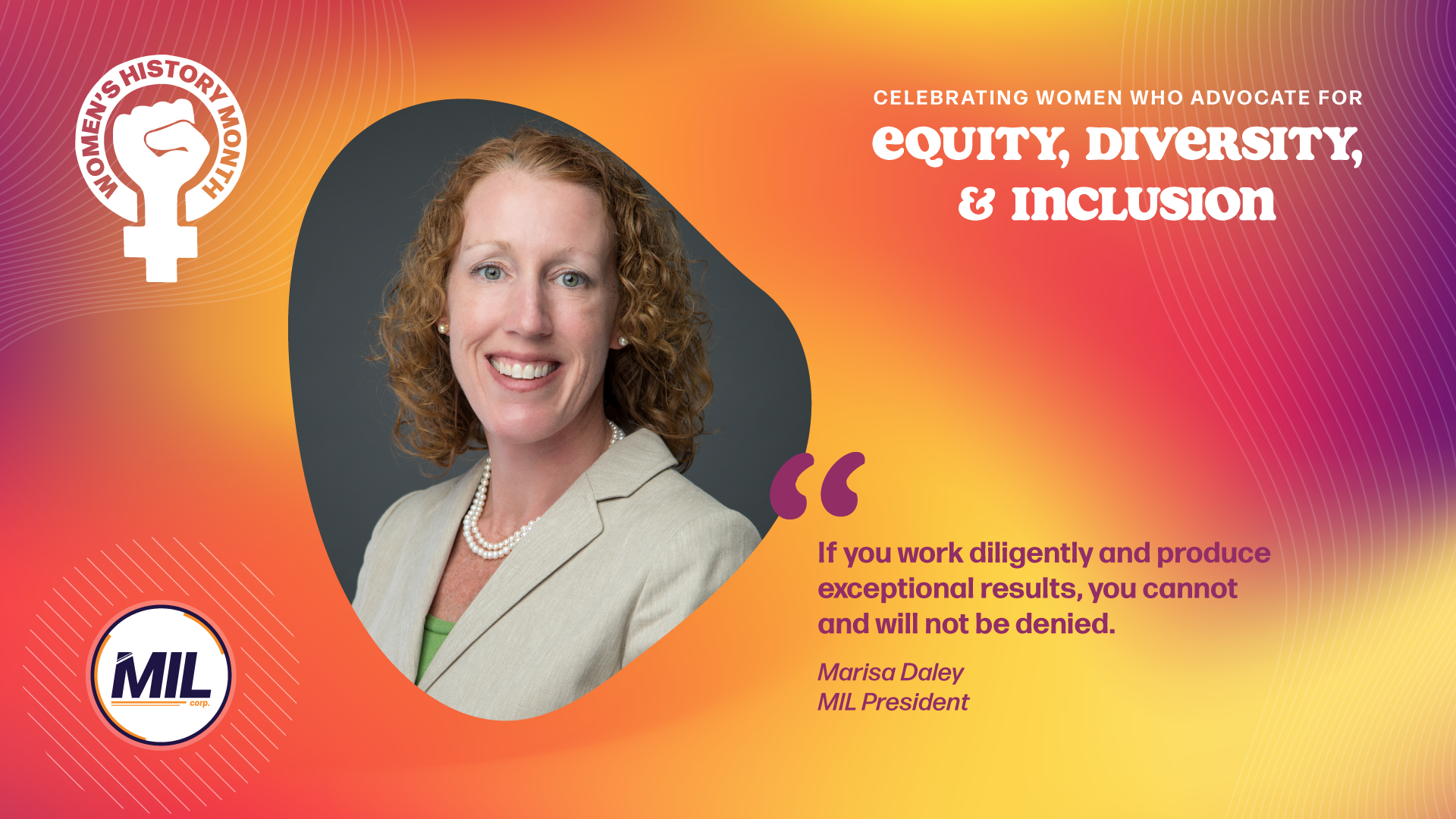
“If you work diligently and produce exceptional results, you cannot and will not be denied.”
Marisa Daley, MIL’s first female President and COO, knows the value of DEI (diversity, equity, and inclusion) since those principles in action—not just in words—are integral to the success of every female executive’s journey. To thrive, what women need most is equal opportunity, not special consideration. Marisa notes that after working and struggling a bit within a patriarchal culture, “I understand the barriers women experience in traditionally male dominated industries. My own personal story has definitely informed my desire to help other women professionals excel and to not allow themselves to be handicapped by perceived or even real obstacles to success.”
The beneficiary herself of mentoring from a strong female role model, in her case from Diane Aikens her lacrosse coach at Loyola College, Marisa appreciates the power of women in leadership, especially to a young woman seeking her own space in the workplace. “I have mentored multiple female leaders throughout my career and encouraged them to strive. I also hope that I’ve inspired them with my own path to setting and achieving goals. My advice is usually pretty straightforward: believe in your own value and work to the level you are comfortable with; there really isn’t a right or wrong approach or outcome.” Adding, “As women, we recognize that every individual’s path is different. Some women may opt to take significant leadership positions while others may be more comfortable with less demanding roles to have more time for family. If you truly want to be a great leader, you have to believe in and be true to yourself. Your authenticity will drive your relationships, your ability to lead, and the belief others have in you.”
On her own personal journey, Marisa acknowledges that self-belief and confidence is not only innate, but a skill that can be developed. “I started my career on Wall Street in an extremely male-dominated environment. To compete, I thought I had to adapt my style of dress and adopt a more masculine behavior to fit in. To stand out less, I thought I needed to blend in more. In short, be more “male.” After years of adapting and adopting to create a persona that wasn’t truly authentic, I came to realize that I shouldn’t need to be other than who I am, and that I’m enough just as I am. I now believe that if you work diligently and produce exceptional results, you cannot and will not be denied.” Concluding, “I think the most significant barrier in my career was man-made—or more accurately woman made—as I thought as a woman I had to act differently to compete and succeed. In truth, I really just needed to believe more in my own abilities and execute accordingly, and then let my performance be judged on its merits.”
Marisa now focuses a sizable portion of her time and talent on strengthening MIL’s business development capability and in cultivating cross-collaboration among teams. Her leadership approach at MIL is fueled by a firm commitment to DEI as she champions initiatives to strengthen and enrich the corporate culture. These efforts have encouraged a free-flowing exchange of ideas among her colleagues and a freedom to innovative that has helped to surface many creative ideas.
___________________________
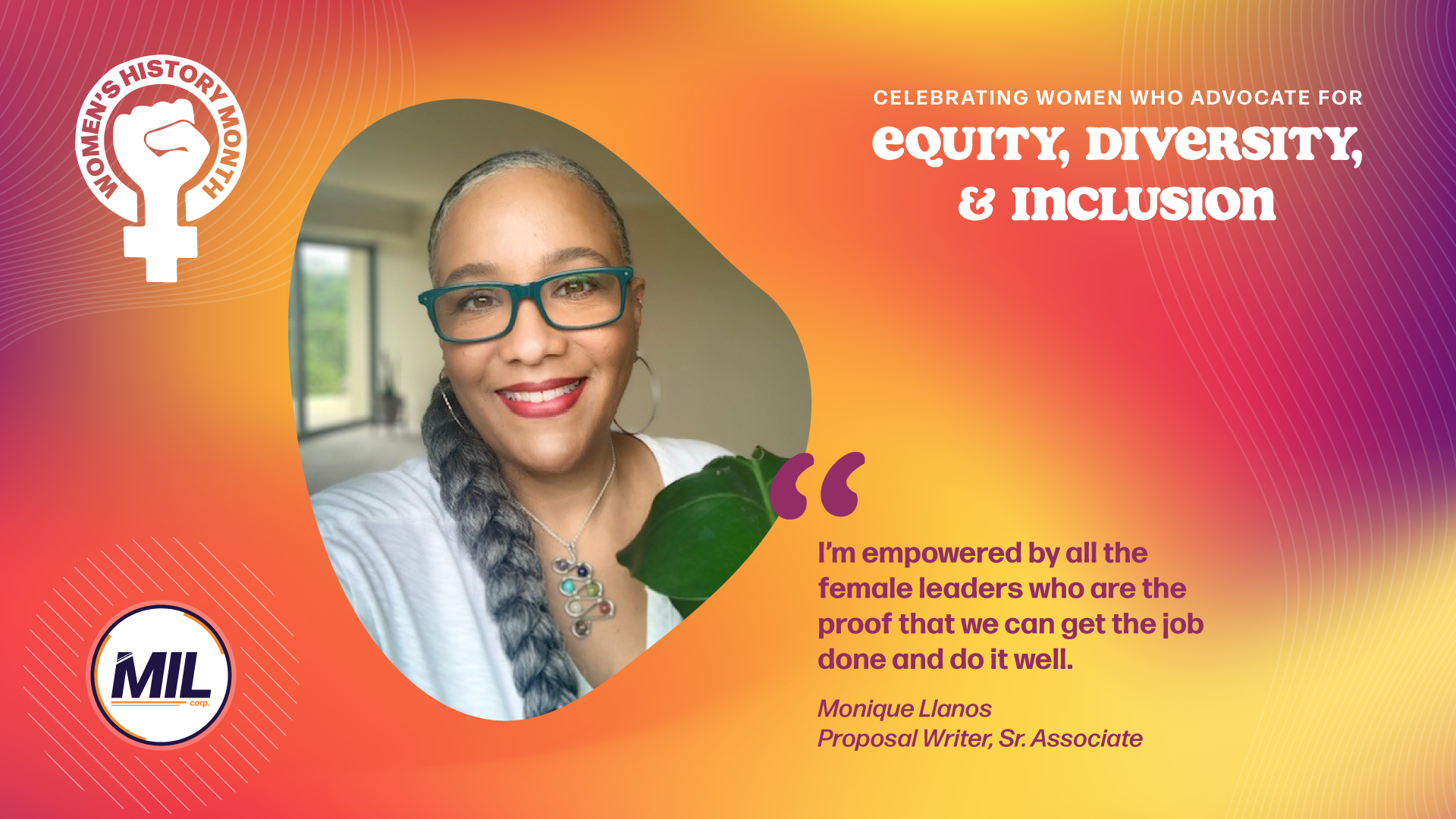
Monique Llanos, writing her own story
“I’m empowered by all the female leaders who are the proof that we can get the job done and do it well.”
Senior proposal writer and communications specialist Monique Llanos has been an essential part of MIL’s P&M team since August 2019. Monique joined MIL after years spent developing winning business proposals for several large consulting and contracting firms. Having worked at organizations with small to very large workforces, Monique is able compare and contrast the experiences and doesn’t believe that growth opportunities for young women are the same. “Interestingly enough I’ve had more positive experiences with medium to small organizations,” she observed, adding “smaller companies tend to focus more on the individual and are more flexible.” “In my experience, medium sized firms like MIL may not have the largest budgets, but they still support growth and advancement in an impactful way. They tend to focus on one’s abilities and help to foster a work environment that utilizes your strengths and help bolster any areas for improvement.”
Over her 20+ years in communications, Monique has seen an increase in the number of women and women of color in leadership roles, noting, “Female CEOs, presidents, and vice presidents were not as prevalent as they are today.” “Even as a young journalism major in college there were not a lot of female journalists (especially of color) that I saw on the local or national stage. The jobs I acquired right out of college, didn’t have very many female role models in the workplace either.”
Understanding it was a male-dominated industry only strengthened Monique’s work ethic. “I always took the position of; “I’m not here by accident; I earned my spot on the roster like everyone else.” She also realized early on that believing in her own abilities was imperative. “By nature I am never overconfident, but I’ve always had a certain amount of self-assurance. I learned to be an effective communicator so that others valued my input and recognized me as an asset to the team. Today I’m empowered by all the female leaders who are the proof that we can get the job done and do it well.”
The importance of role models for guidance and proof of possibility is vital in Monique’s estimation. “Over the years I didn’t have just one role model. I sought out insight from any of my colleagues who were willing to share their knowledge and expertise. I appreciated all my mentors and over time served as a mentor myself.” Monique points out that “professional development and advancement are closely aligned so having someone more experienced to provide insight and guidance is always advantageous.”
As any mentee turned mentor knows, insider info is sometimes the most valuable. Monique’s insight? “Be professional. That means taking pride in whatever you do and taking the time to understand your work environment and the varied personalities within it. There is no app for that. LOL!” She also advises young women and men to “understand the resources available to you and utilize them,” “show up on time and ready to make a difference,” and “be an effective communicator by being an even better listener.”
Final thoughts? “One of the things I am truly grateful for today is to have found a company like MIL where the women I have encountered have been the most supportive. We have unique perspectives to share and if we learned from our experiences on our journey to work success then others can too.”
___________________________
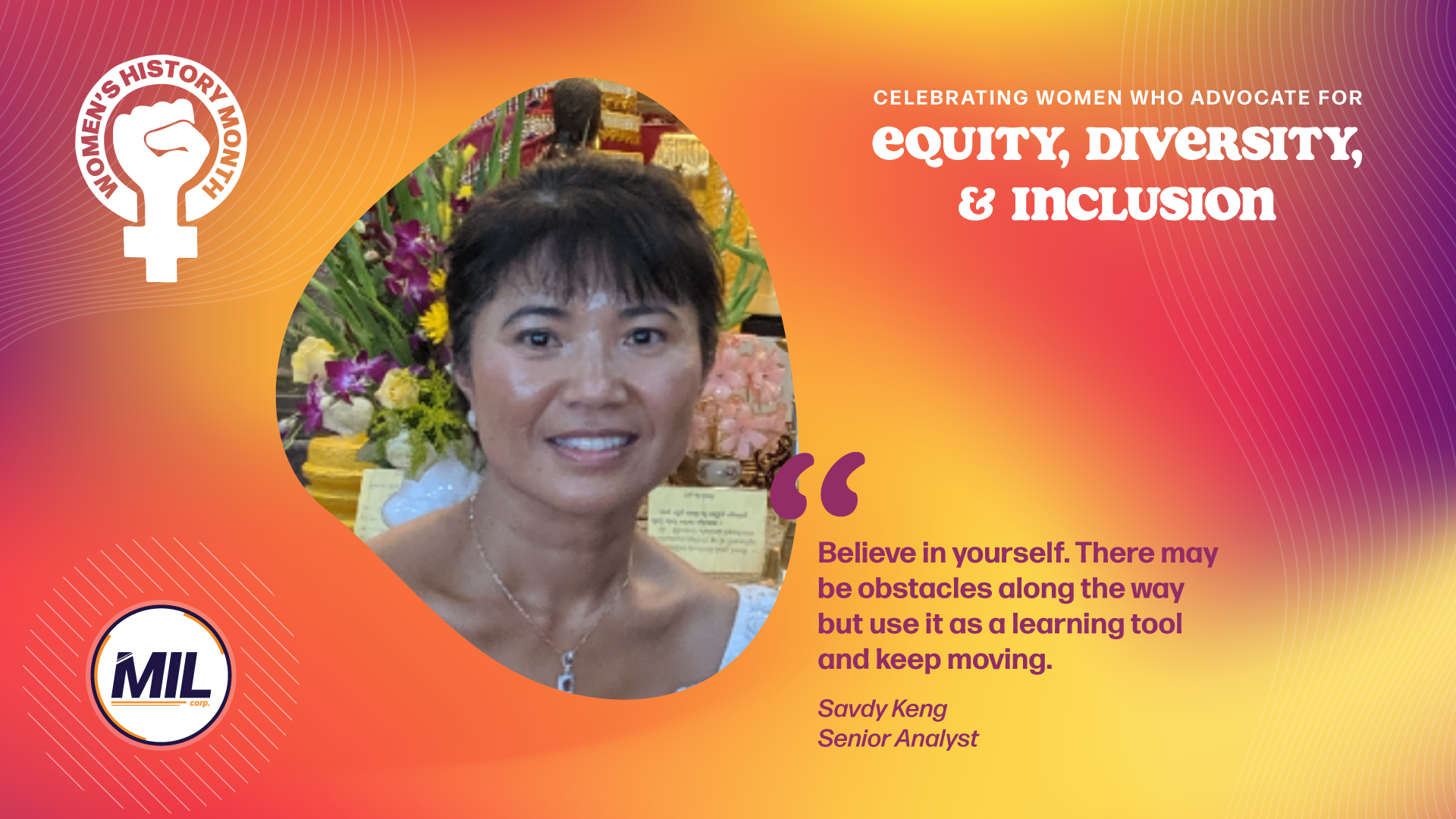
Savdy Keng, moving in a world of numbers
“Believe in yourself. There may be obstacles along the way but use it as a learning tool and keep moving.“
MIL’s Savdy Keng came to her current Senior Analyst position after a nearly 30-year career in the financial services industry. With stints in banking (where she worked as both an assistant head teller and accounting clerk), an engineering management firm, an aerospace company, and several professional services slash federal contractors, Savdy has filled any number of accounting, analysis, and project control roles. What hasn’t changed over the years is her affinity for numbers. In fact, she attributes her career path to finding something that she enjoyed and was good at (working with numbers) and sticking with it.
Savdy’s financial industry origin story beginning in a bank is not surprising. The number of female employees in the total workforce of most leading U.S. banks is above 50 percent, with some banks employing well over 60 percent women. Making U.S. banks and lending institutions a viable first stop for women interested in a career in finance. Asked what qualities and abilities she felt were essential to succeeding in the financial services field, Savdy pinpoints problem-solving abilities and a willingness to keep learning as new requirements arise. She also highlights the need to be both detail-oriented and able to work effectively as part of a larger team.
Savdy attributes some of her current belief in her own abilities to a female mentor from her early days supporting the Defense Department. Along with telling her not to be afraid of making mistakes—because everyone does—her mentor also advised her on the value of a deliberated response, counseling Savdy to “take a step back and take a deep breath and think before you speak.” She also emphasized the importance of self-assurance, encouraging her not to be afraid to take on a challenge. Years later, she still remembers the inspiration. Savdy’s own experience mentoring and guiding fellow female mentees dates back to her banking days when she first trained new employees. And like her own mentor, she let her trainees know that mistakes are inevitable and are intended to teach them.
When asked about the best advice she was ever given by a female leader, Savdy wisely replied, “Listen more when others are talking.” Adding, that good listening skills help you understand people better so you can see things from their point of view. Which, in turn, helps you figure out what they’re looking for so you can provide them the best solution. Savdy’s own advice for women entering the financial field? Never give up. “Believe in yourself. There may be obstacles along the way but use it as a learning tool and keep moving.”
___________________________
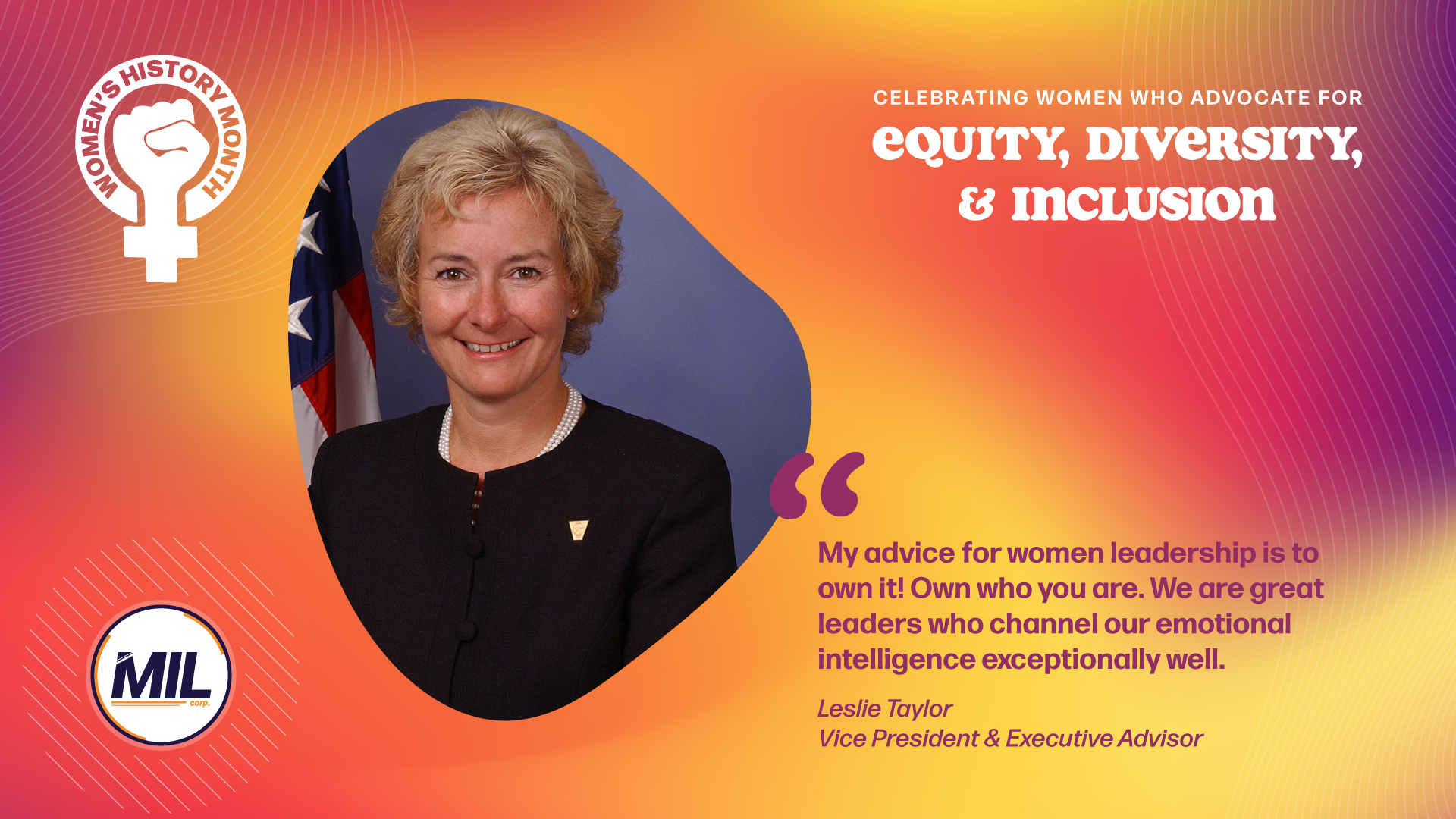
Leslie Taylor, leading the way for women in engineering
“My advice for women leadership is to own it! Own who you are. We are great leaders who channel our emotional intelligence exceptionally well.”
At the time she joined the Naval Air Systems Command (NAVAIR) civil service as an engineer, Leslie Taylor was one of a very few women in the engineering workforce—there or anywhere. During her 36-year career at NAVAIR, Leslie served as a weapons tester and flight test engineer before moving up to lead Naval Aviation’s flight test programs eventually overseeing over 900 flight test engineers across five geographic sites. She trailblazed as the Executive Director of Test Flight Engineering USN, as the first female Executive Director leading the 10,000-employee workforce of the Naval Air Warfare Center Aircraft Division, before a move into the role of Deputy Assistant Commander for Test and Evaluation at NAVAIR, and then into the NAVAIR Vice Commander’s position. After her retirement from civil service, Leslie now serves as a VP and Executive Advisor at MIL.
Asked how she set herself apart professionally and set the stage for advancement, Leslie stated, “One way for me was getting my master’s degree in the field of Engineering Management. Another way was taking advice from mentors wiser than I was when it came to taking opportunities that were presented to me.”
Now frequently serving as a mentor herself, Leslie has the opportunity to pay it forward by supporting the next generation of women leaders. “My way of inspiring and empowering women (and anyone else who wants my input or advice) is to be a considerate, thoughtful mentor. Sharing experiences, good and bad, with others has become something I do routinely.” Leslie also empowers women by supporting Diversity, Equity and Inclusion (DEI) efforts whenever possible. “I served as a Diversity Action Team Executive Champion for many years. I was the founding champion of the Women’s Action Group and the LGBTQ+A Action Group. I was also on the Command’s Diversity & Inclusive Executive Team. My passion for this topic led me to get my DE&I Certificate from Cornell University shortly after I retired.”
Her best advice to women? “Own it! Own who you are. We are great leaders who channel our emotional intelligence exceptionally well. I teach a series of courses I’ve developed entitled “Leadership Matters” that promotes Servant Leadership and Situational Leadership, which are only enabled by being emotionally intelligent. I have observed this as coming easier to women. I have also observed women try to suppress that to be more like men. Nope – don’t do it! Be yourself and genuinely care. To quote RADM Chet Lemmon, one of my favorite leaders, “Be Passionate, Be Committed, and Care!” Women do that well!”
___________________________
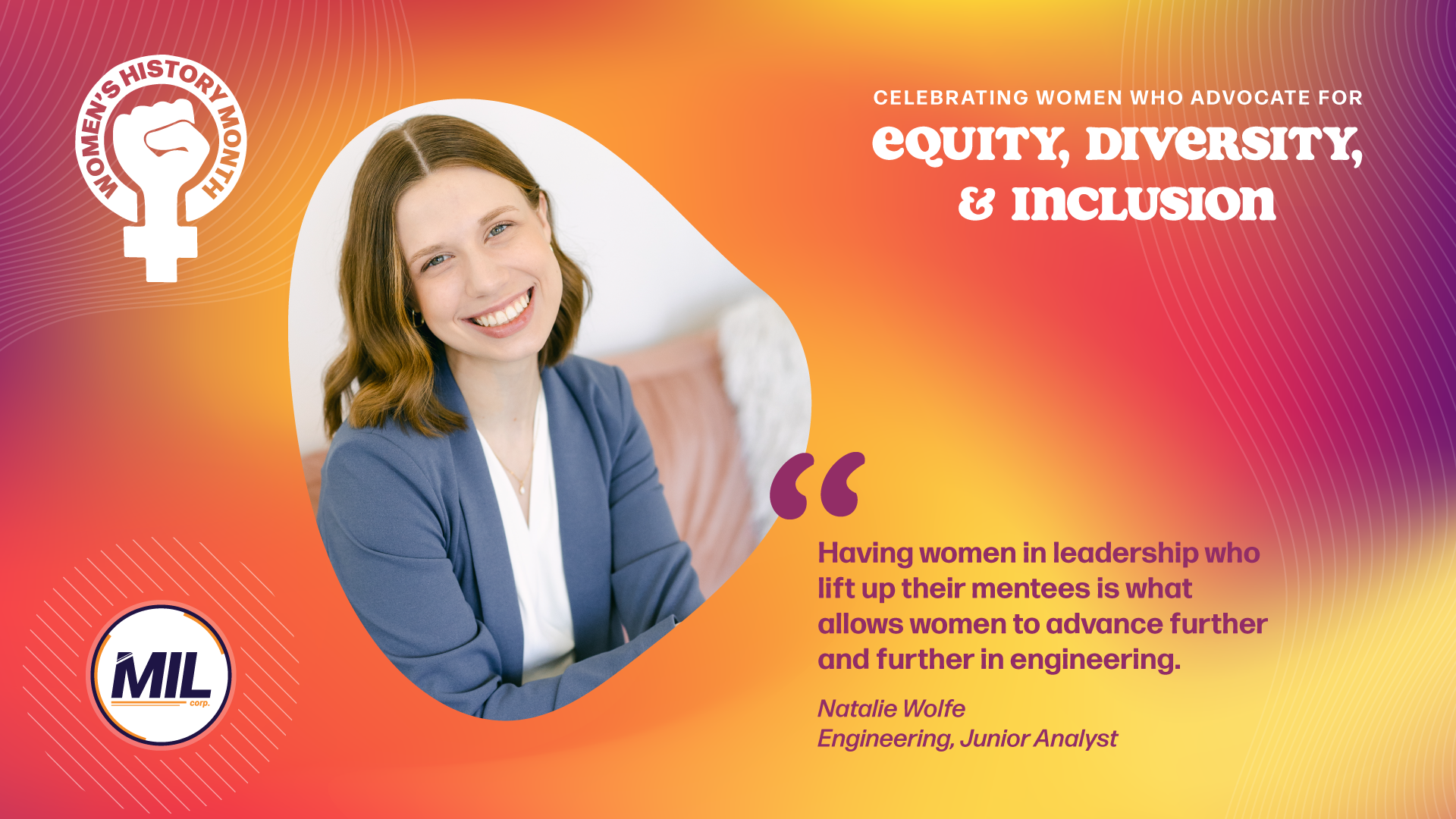
Natalie Wolfe, a voice from the next generation
“Having women in leadership who lift up their mentees is what allows women to advance further and further in engineering.”
Despite the achievements of trailblazing engineers like MIL VP and Executive Advisor Leslie Taylor, only roughly 16 percent of the engineers in the U.S. are women. And according to data from the Society of Women Engineers, female mechanical engineers like MIL’s Natalie Wolfe account for only 10% in the industry. This dearth of women in the profession creates challenging downstream effects for the ones who do pursue an engineering path. One of those effects is a scarcity of professional role models and mentors in the workplace. We asked Natalie to share some of her thoughts and experiences on what it’s like being one of the “1 in 10.”
“I’ve advocated for women in engineering in the past in a variety of ways during my time in school, including being in a women in engineering professional sorority, being a member of the Society for Women Engineers, and mentoring other female engineering students.
I currently advocate for more women in the field of engineering by working with high school students (judging robotics competitions/science fairs) and volunteering; I want to be the person/mentor/etc., that I had wished I had when I knew I wanted to go into engineering in high school.”
On the value of female role models, both academic and in the workplace, Natalie said, “Having women in leadership positions throughout the company is great to see as a young employee. I also have had quite a few role models in the form of professors at school, alumni from my school, and other female engineers throughout the NAVAIR community. Having the support of other female engineers is amazing because engineering is such a male-dominated field; we lift each other up.”
“I have been a mentor for a female intern. I can’t tell you how much of a difference it makes for both the mentor and mentee to have that sense of community and for the mentee to have someone to look up to,” she noted. Adding, “Having women in leadership who lift up their mentees is what allows women to advance further and further in engineering.”
Representation is just one of the challenges female engineers like Natalie encounter—along with other young women in the workforce—which is why MIL believes female leadership is so important to the professional development and morale of its younger female employees. To be seen, heard, and understood is vital to ensuring women in the workforce feel respected and cared for by their employer. But so is ensuring issues of particular importance to women are accommodated; working women need to be supported in their quest to maintain a healthy work-life balance. “Even though I haven’t used it, I think that appropriate parental and maternity is one of the most important things that a lot of women look for when joining a company,” Natalie shared. “We want to know that if we take the time off to care for family, we will be welcomed back and treated fairly after doing so.”
When asked if women in leadership should champion issues affecting women in the workplace, Natalie responded “yes.” “I do expect them to help advance multiple issues in the workplace, especially gender bias, sexual harassment, and just general camaraderie amongst other women in the workplace.”
